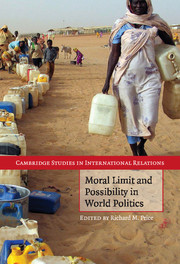Book contents
- Frontmatter
- Contents
- List of contributors
- Preface
- 1 Moral limit and possibility in world politics
- 2 Constructivism and the structure of ethical reasoning
- 3 The role of consequences, comparison and counterfactuals in constructivist ethical thought
- 4 Sovereignty, recognition and indigenous peoples
- 5 Policy hypocrisy or political compromise? Assessing the morality of US policy toward undocumented migrants
- 6 Lie to me: sanctions on Iraq, moral argument and the international politics of hypocrisy
- 7 Paradoxes in humanitarian intervention
- 8 Inevitable inequalities? Approaching gender equality and multiculturalism
- 9 Interstate community-building and the identity/difference predicament
- 10 Progress with a price
- Index
- Cambridge Studies in International Relations
- References
2 - Constructivism and the structure of ethical reasoning
Published online by Cambridge University Press: 14 May 2010
- Frontmatter
- Contents
- List of contributors
- Preface
- 1 Moral limit and possibility in world politics
- 2 Constructivism and the structure of ethical reasoning
- 3 The role of consequences, comparison and counterfactuals in constructivist ethical thought
- 4 Sovereignty, recognition and indigenous peoples
- 5 Policy hypocrisy or political compromise? Assessing the morality of US policy toward undocumented migrants
- 6 Lie to me: sanctions on Iraq, moral argument and the international politics of hypocrisy
- 7 Paradoxes in humanitarian intervention
- 8 Inevitable inequalities? Approaching gender equality and multiculturalism
- 9 Interstate community-building and the identity/difference predicament
- 10 Progress with a price
- Index
- Cambridge Studies in International Relations
- References
Summary
Why should we study international relations? What ought to be the purposes of this field of study? Is it sufficient to be a group of scholars animated by nothing more than our idiosyncratic intellectual curiosities? Or does ‘science for science's sake’ constitute a compelling rationale for our endeavours? Are there deeper purposes than these that should, or perhaps do, animate our research, teaching and public engagement? And if there are such purposes, what are their implications for how we imagine International Relations (IR) as a field of inquiry, and for how we go about our scholarly pursuits?
In the following pages I make the case for one possible answer to these questions, that International Relations ought to be concerned first and foremost (though not exclusively) with the praxeological question of ‘how should we act?’ that animates this volume. It should confront directly, and unashamedly, the most challenging issues of human action in a globalising world, a world characterised by political convergence and division, cultural homogenisation and diversification, economic growth and persistent inequality, and the transformation of organised violence. It is a purpose rooted in the origins of our field, one that its early architects took as axiomatic, one that E. H. Carr saw as the mark of a ‘mature science’ of International Relations. It is also a purpose still animating the field, though in a subterranean fashion, as much forgotten as denied.
- Type
- Chapter
- Information
- Moral Limit and Possibility in World Politics , pp. 53 - 82Publisher: Cambridge University PressPrint publication year: 2008
References
- 9
- Cited by



